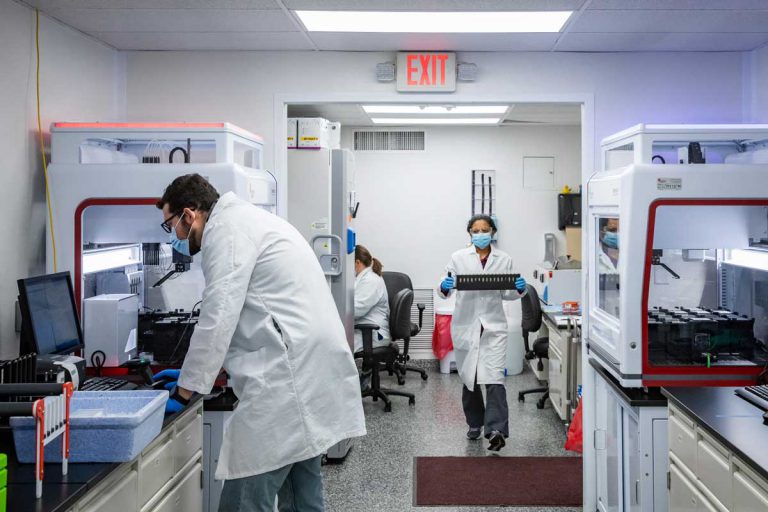URBANA – OSF HealthCare announced a new partnership with the University of Illinois Tuesday that will expand the U of I’s saliva-based COVID-19 test into the broader Champaign-Urbana community.
Starting next Friday, the saliva test will be available to students, teachers and staff at two schools in Champaign-Urbana: Stratton Academy of the Arts and Urbana High School.
Testing at both schools will be done weekly on site. Samples will be transported to U of I labs for analysis, with oversight from OSF.
The university is charging schools $10 per test — a cost that will be covered through June by a grant from the Rockefeller Foundation, said U of I psychologist Neal Cohen, who co-leads the new SHIELD CU initiative with OSF HealthCare, at a virtual COVID-19 briefing.
After the grant for the pilot program runs out, Cohen said he’s hopeful additional funding streams will allow the testing at schools to continue — and even expand to more schools and underserved communities in the area, as well as local governments and businesses.
“[We’re] looking to partner more broadly — with agencies, with donors, with organizations — so that we can make this as broadly available as possible,” Cohen said.
The SHIELD CU program is also expanding the U of I’s saliva test to employees of Champaign County, as well as household members of U of I students and employees, for a fee of $10 per test.
(No-cost COVID-19 testing continues to be available through the community based testing site at the Market Place Shopping Center in Champaign and other sites listed on the CU Public Health website.)
U of I Chancellor Robert Jones said the decisions about how to expand the U of I’s saliva-based test were made by listening to community partners.
“Public engagement means we do what the community wants to be done,” Jones said in a news conference held Tuesday. “The university doesn’t come in and impose and decide who gets tested and who doesn’t get tested. This was informed through conversations with [the Champaign-Urbana Public Health District], both cities, as well as the county and other partners.”
SHIELD CU co-lead Wanda Ward says the campus was compelled to reach out to under-resourced and underserved schools first, with the goal of addressing racial and ethnic disparities that have been highlighted throughout the pandemic.
“We have strategically piloted with schools that serve 60-80% students who receive free or reduced lunch,” said Ward, who is the executive associate chancellor for administration at the U of I. “And so, we’re strategically pairing the ethnic [and] racial considerations with equity considerations to address that as much as we can.”
Ward says SHIELD CU is also taking into account geographic diversity — addressing the needs of both urban and rural communities, as well as immigrant populations, with the goal of using testing as a tool to keep the rate of viral transmission in Champaign County trending downward.
SHIELD CU participants will have access to the Safer Community app, which is similar to the Safer Illinois app developed for the U of I’s COVID testing program. The app walks participants through the process of finding testing centers and provides test results and any follow-up information directly to participants.
Jones said the campus initially had hoped to launch SHIELD CU by the end of last year but were delayed due to regulatory and compliance challenges.
“[There were] a lot of moving parts… some of which were relatively easy to do to stand this up for campus, but much more complex to do when you’re bringing in a community,” Jones said.
Christine Herman is a reporter for Illinois Newsroom. Follow her on Twitter: @CTHerman

